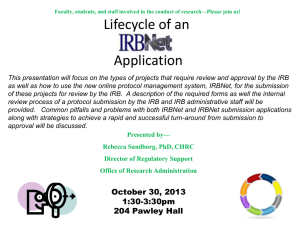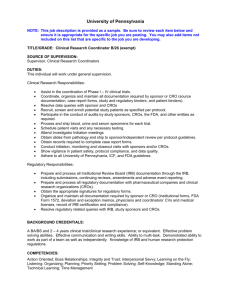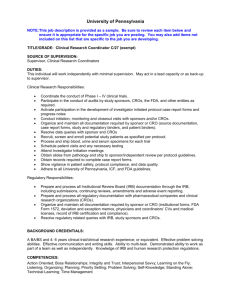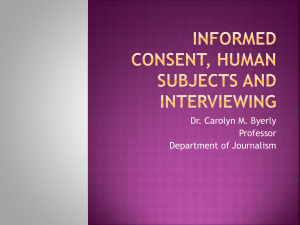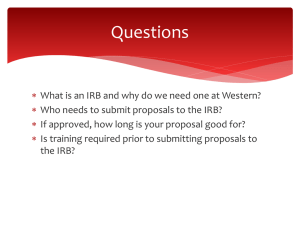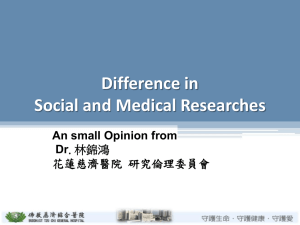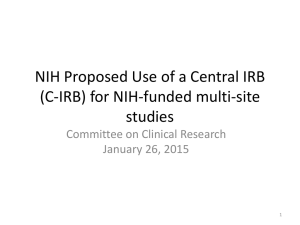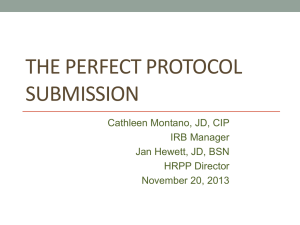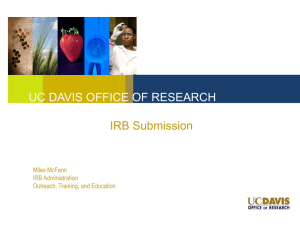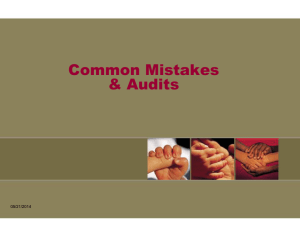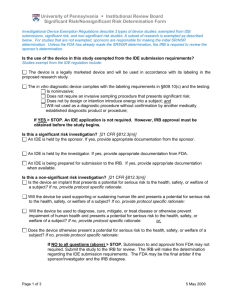Brown Bag AAHRP Site Prep
advertisement
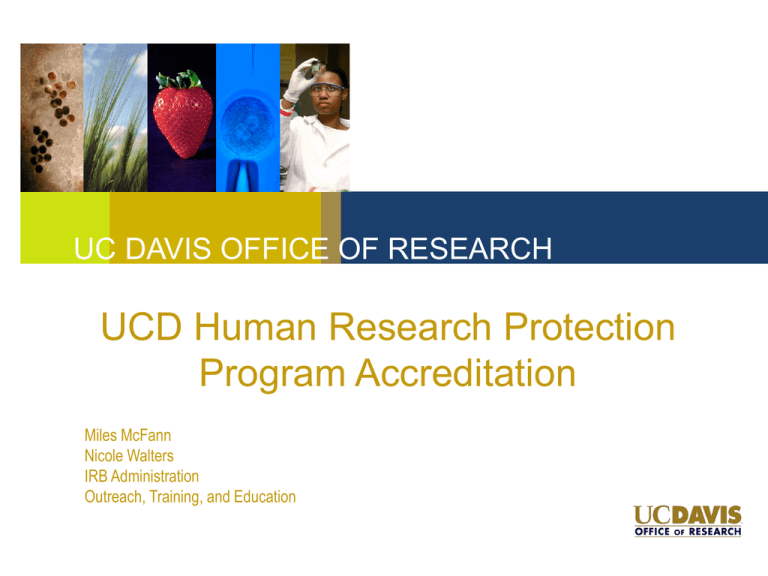
UC DAVIS OFFICE OF RESEARCH UCD Human Research Protection Program Accreditation Miles McFann Nicole Walters IRB Administration Outreach, Training, and Education Objectives AAHRPP Benefits of Accreditation Where Are We In The Process Faculty and Staff Preparation UCD Human Research Protection Program Investigator Manual An independent, non-profit accrediting body, that ensures the HRPPs meet rigorous standards for quality and protection. Benefits of AAHRPP Respect Competitive Edge Reduce Risk Enhance Standing Where Are We In The Process Faculty and Staff Preparation Grand Round Visits Monthly Brown Bag Series Interview Prep Listserv Announcements Website with Online Education HRP-101: Human Research Protection Program Plan research.ucdavis.edu/ irbadmin 7 UCD Human Research Protection Program Institution Researchers HRP-101 Human Research Protection Program Plan IRB What do mean when we say UCD is “engaged” in human subject research? 1.If UC Davis is the federal grant recipient; 2. If for purposes of human subject research: (a) Data about subjects through intervention or interaction; (b) Identifiable private information (c) Informed consent from a research subject 9 Research FDA Definition: Clinical Investigation: An experiment involving a test article and control when the results must meet requirements for prior submission to the FDA or are intended to be later submitted to or held for inspection by the FDA OHRP Definition: Research: A systematic investigation, including research development, testing and evaluation, designed to develop or contribute to generalizable knowledge. 10 What are the three ethical principles of the Belmont Report? Respect for persons – autonomy Beneficence – do no harm Justice – distribution of risks and burdens 11 FWA (Federalwide Assurance) What is UC stance on Payments for Referrals or Accelerated Enrollment? 13 Complaints Report To: IRB Chair IRB Administration Organizational Official Legal Counsel Deans Department Heads 14 IRB Responsibilities Review Research: • Approve • Suspend • Terminate • Determinations Observation Suspension or Termination Organizational Official The Vice Chancellor for Research, Harris Lewin 17 HRP-103: Investigator Manual research.ucdavis.edu/ irbadmin 18 PI Eligibility Faculty Members Paid Appointments 50% or greater Students Faculty Advisor Researcher Training Minimal Risk: CITI or NIH online course > Than Minimal Risk: CITI Clinical Trial CITI + GCP 20 Review Types Not Human Subject Research (NHSR) Exempt Expedited Convened Meeting What are Approve decisions the IRB Committee may make when conducting a review? Modification required to secure approval Deferred Tabled Disapprove 22 Record Keeping – Non FDA 3 years after the study is completed ___ If children are included : 7 years after the • at least ___ youngest child reaches the age of 18 ___ If research involves in vitro or pregnant women : 25 years • at least ____ If sponsored : • review the CTA, contact the sponsor, or ask the Office of Sponsored Programs Record Keeping – FDA The retention requirements outlined in the Clinical Trial Agreement (CTA) - or 2 years following the date a marketing application is approved for the drug/device for the indication for which it is being investigated; - or Or, if no application is to be filed or if the application is not approved for such indication, for 2 years after the investigation is discontinued and the FDA is notified Emergency Use of an Unapproved Drug, Biologic, or Device: No Time for the IRB Unapproved Drug, Biologic, or Device Contact IRB Admin or IRB Chair (HRP-322) Emergency Use Worksheet (HRP-506) Emergency Use Template Consent Form Report to IRB within 5 days Drug/Biologic use submit IRB Protocol within 30 days Emergency Use: The difference between the requirements for unapproved drugs and devices: Use of an unapproved Use of an device is not unapproved drug considered or biologic is “research” and considered the patient not a “research” and “subject” the patient is a “subject” In Contrast, the DHHS looks at the data obtained through emergency research as: Patients cannot be considered a “subject” and the results cannot be included in “research” 27 Ancillary Committee Approvals • Institutional Biosafety Committee • Prior Approval • Conflict of Interest Committee • Prior Approval • Radiation Use Committee • Prior Approval • Stem Cell Research Oversight Committee • Concurrent Approval • Cancer Center Scientific Review Committee • Prior Approval 28 Reportable New Information • New Risk • Severe Harm • Non-Compliance • DSMB Reports • and the rest…… 29 Questions? 30 Miles McFann, CIP mtmcfann@ucdavis.edu

